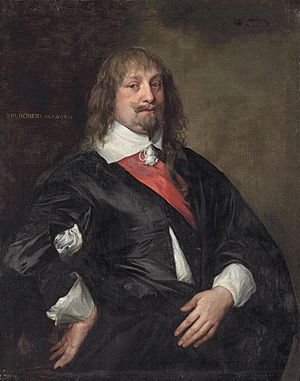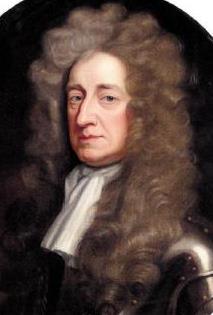Robert Howard (playwright) facts for kids

Sir Robert Howard (born January 1626 – died 3 September 1698) was an English writer who wrote plays, and also a politician. He was a brave soldier who fought for the King's side (the Royalists) during the English Civil War.
Contents
Robert Howard's Life Story
Robert Howard was the sixth son of Thomas Howard, 1st Earl of Berkshire. When he was 18, he fought in the battle of Cropredy Bridge and was made a knight because he was so brave. After the English Civil War, he supported the King, which led to him being put in prison at Windsor Castle in 1658.
Becoming a Politician
When the King returned to power in England (this was called the Restoration), Robert Howard quickly became important in politics. He was given several jobs that gave him power and money. He was a Member of Parliament (MP) for different areas, including Stockbridge and Castle Rising. He believed that the Parliament and the King should work together and have a good balance of power.
He held many powerful positions throughout his life. In 1671, he became a top helper for the Treasury, which manages the country's money. In 1673, he became the person who checked the government's accounts. He also helped bring William of Orange to the throne. In 1689, he became a special advisor to the King, called a privy councillor. He was always interested in money matters and even supported the new Bank of England. He also worked on making the country's money system better.
"We the People"
Robert Howard was the first person known to use the famous English phrase "We the People." He used it during a debate in Parliament on 28 January 1689. He was talking about King James II and said that if a king acts only by his own will and not by the laws, he is not truly a king. Howard believed that the people also had rights, just like the King had his crown by "Divine Right." He said that a king could lose his power if he broke his agreement with the people.
His Personality and Death
Some people thought Robert Howard was a bit proud. A writer named Shadwell even made fun of him in a play, calling a character "Sir Positive-At-All," who was a boastful knight. Robert Howard died on 3 September 1698 and was buried in Westminster Abbey, a very famous church in London.
Robert Howard's Writings and Plays
Most of what Robert Howard wrote was for the stage, meaning plays. He also wrote some poems and two books about political ideas. One of his books, The Life and Reign of King Richard the Second, was published without his name on it in 1681.
Working in Theatre
After the King returned, Robert Howard was very active in the theatre world in London. He helped design the sets for plays and was also a part-owner of the Theatre Royal. His plays were quite popular and were still performed even in the 1700s. However, some later critics, like Walter Scott, didn't like them as much.
His most popular play was a funny political play called The Committee; Or, The Faithful Irishman (1665). It made fun of the manners of the time when England was a republic. Another play, The Great Favourite, or The Duke of Lerma, was liked by some writers.
Working with John Dryden
Robert Howard also worked with his brother-in-law, the famous poet John Dryden. They wrote a play together called The Indian Queen, which later had music added to it by Henry Purcell. Robert Howard had supported Dryden for a while. They later had a public argument about whether plays should use rhyme, but they became friends again before Howard died. John Dryden even wrote a poem praising Robert Howard's writing skills.
Robert Howard's Family
Sir Robert Howard was married four times.
His first wife, Anne Kingsmill, was the mother of his six children. After she died, he married Lady Honoria. She was an older widow who owned a large house called Wootton Bassett. Lady Honoria later complained to the King and to the Parliament that Robert Howard was not giving her any of the money she had brought into their marriage.
His third wife was Mary Uphill. She often stayed at Howard's house in Ashtead, which he bought around 1680. In 1693, he married his fourth wife, Anabella Dives, who was only 18 years old.
His Children and Relatives
His only son who lived to be an adult was Thomas. His daughter, Mary Howard, became a nun in a convent in France.
Robert Howard came from a very famous family. He was the great-grandson of Henry Howard, Earl of Surrey, who, along with his friend Sir Thomas Wyatt, were known for being the "Fathers of the English Sonnet." They were the first English poets to write in the sonnet style that William Shakespeare later used.
Robert Howard also had three brothers who wrote plays: Edward Howard, Colonel Henry Howard, and James Howard. His sister, Elizabeth Howard, was married to the very important English poet and writer John Dryden.
 | Dorothy Vaughan |
 | Charles Henry Turner |
 | Hildrus Poindexter |
 | Henry Cecil McBay |


